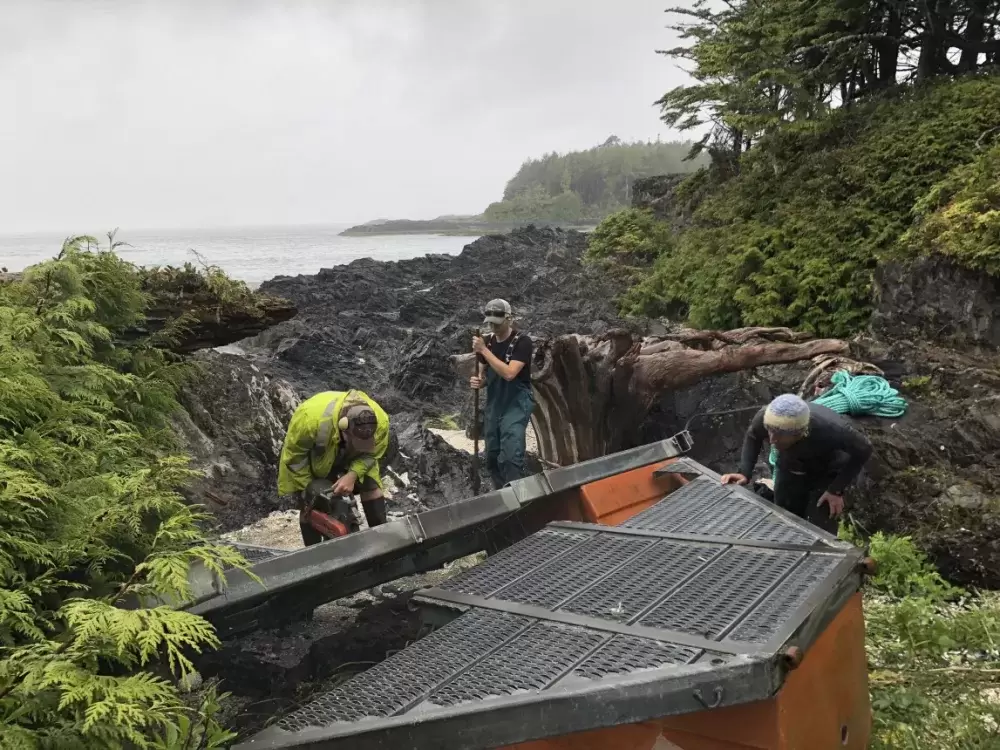Local efforts in coastal communities have been nothing short of “heroic” but are not enough to stem the tide of debris washing ashore on the west coast, said Courtney-Alberni MP Gord Johns.
Despite the promise of its Ocean Protection Plan launched two years ago, the Canadian government hasn’t stepped up on ocean waste and has left locals to shoulder the cost of ongoing cleanup efforts, Johns contends.
Hopes were dashed again after a plastics accord, concluded as part of last week’s G7 summit in Montreal, was short on specifics.
“Canadians were expecting an action plan with strategies and clear targets, but instead we got a nonbinding, vague outline that misses the mark entirely,” he said from Ottawa. “Canadians know we need action now.”
Declaring Vancouver Island “ground zero” in the problem of ocean-borne plastic, the MP has been spearheading a Parliamentary motion this spring calling for a national strategy to combat plastic pollution.
“We have a really important responsibility to be stewards of these waterways,” Johns said. “They’ve leaving it to the coastal communities to pick up the bill and contributing nothing.”
Chief Councillor Greg Louie of Ahousaht First Nation agreed there needs to be a more consistent and formalized approach to what seems to be a growing tide of debris.
“Since the quake/tsunami in Japan, there seems to be a higher influx coming to the beaches, but I also think there’s far greater awareness of keeping the beaches clean,” Louie said.
An estimated 25 million tonnes of debris entered the Pacific in the 2011 Japanese natural disaster. Over the next five years, tonnes of flotsam washed up on west coast shores. Nuu-chah-nulth Tribal Council together with local governments, citizen volunteers and Parks Canada, responded concertedly between 2012 and 2016. Then came the Hanjin Seattle, spilling 35 shipping containers off the west coast, leading Johns to call for a comprehensive action plan to deal with marine debris. Only a fraction of federal funds earmarked for that cleanup went to cover local costs, the MP said.
“When it comes to debris, our guys are telling us that there’s a lot out there,” Louie said. “So where is this debris coming from. Japan? Shipwrecks or boat wrecks? People throwing things over the side? I don’t know.”
Groups such as Clayoquot CleanUp and Surfrider Pacific Rim Foundation, working in partnership with First Nations, have had a noticeable impact on a local level in the last few years.
“Collectively they’ve done a really heroic job, but they haven’t been properly resourced by the federal government,” Johns said.
Earlier this month, one of the largest fish farm operators on the Island tackled some of the larger, more remote challenges in Clayoquot Sound. Cermaq Canada hired Atleo River Air Services to airlift old sea pen systems half-buried for years on Vargas and Flores islands. With help from Wichito Marine Service, crews equipped with cutting tools and shovels spent a week reducing the debris to 300-kilogram chunks.
“This debris is from long before Cermaq started farming in this region but removing it and restoring these beautiful beaches is the right thing to do,” said Richard Finch, Cermaq Canada’s sustainability manager.
“I’m not saying we’re not a contributor,” he added. “This is one of the reasons to participate. This is the idea, to mitigate. We also endorse the efforts of others such as Clayoquot CleanUp.”
Norwegian-based Cermaq, owned by Mitsubishi, has had a partnership with Ahousaht First Nation since 2008 with the objective of fostering a new relationship.
Responding to Johns’ criticism in the House of Commons, Environment Minister Catherine McKenna agreed that plastics represent a “huge problem,” noting that by 2050 the weight of plastics in the ocean will exceed the combined weight of sea life if nothing is done. She said they are working on a national strategy for plastics and that municipal government are also stepping up.
Lilly Woodbury, a Tofino-based chapter manager with Surfrider, said the foundation works with both the Tla-o-qui-aht and Ahousaht First Nations, assuring they have approval before proceeding with cleanup efforts in respective territories. Last year alone, volunteers collected 20 tonnes of marine debris along Barkley and Clayoquot sounds, including 100,000 cigarette butts. She said local collaborative initiatives are making a difference.
Cermaq’s Clayoquot Sound cleanup was one of several Island projects held in conjunction with World Oceans Day, June 8.
“I think it’s a good initiative,” Finch said. “When you’re flying around in a helicopter, it’s amazing how much debris could be seen on the coast. My thinking is that much of that debris is from offshore.”
Cermaq has in the past helped remove debris and derelict boats from Ahousaht Harbour, Finch noted. He hopes the company can work with local First Nations on more cleanup projects.
“We hope so. They’re the ones who are most familiar with the territory.”
Johns feels the Trudeau government has to take a more pro-active approach to protecting the marine environment if it expects to proceed with plans to expand the Trans Mountain pipeline and increase oil tanker traffic along the coast. He holds out hope that his ocean plastics plan will pass a Parliamentary vote this fall.
“Those West Coast protections don’t exist and the confidence in our communities is weak at best,” Johns said. “They need to expand right now just to build confidence in communities and build the social licence they need to do it.”
The motion calls on the Canadian government to work with Indigenous communities, provinces and municipalities to:
- Create a permanent, dedicated and annual fund for community led cleanup projects.
- Reduce consumer and industrial use of single-use plastics.
- Create plan to clean up derelict fishing gear.
- Promote education and outreach campaigns on the causes of environmental effects of plastic pollution.







